DUBAI: On Jan. 11 South Africa asked the International Court of Justice at The Hague to rule on whether Israel’s ongoing military campaign in Gaza amounted to genocide. Israel responded by accusing the country of “functioning as the legal arm” of Hamas.
But South African support for the Palestinians is not a new phenomenon. For years its government and civil society have shown unwavering support for the Palestinian cause, despite considerable geographical and cultural differences.
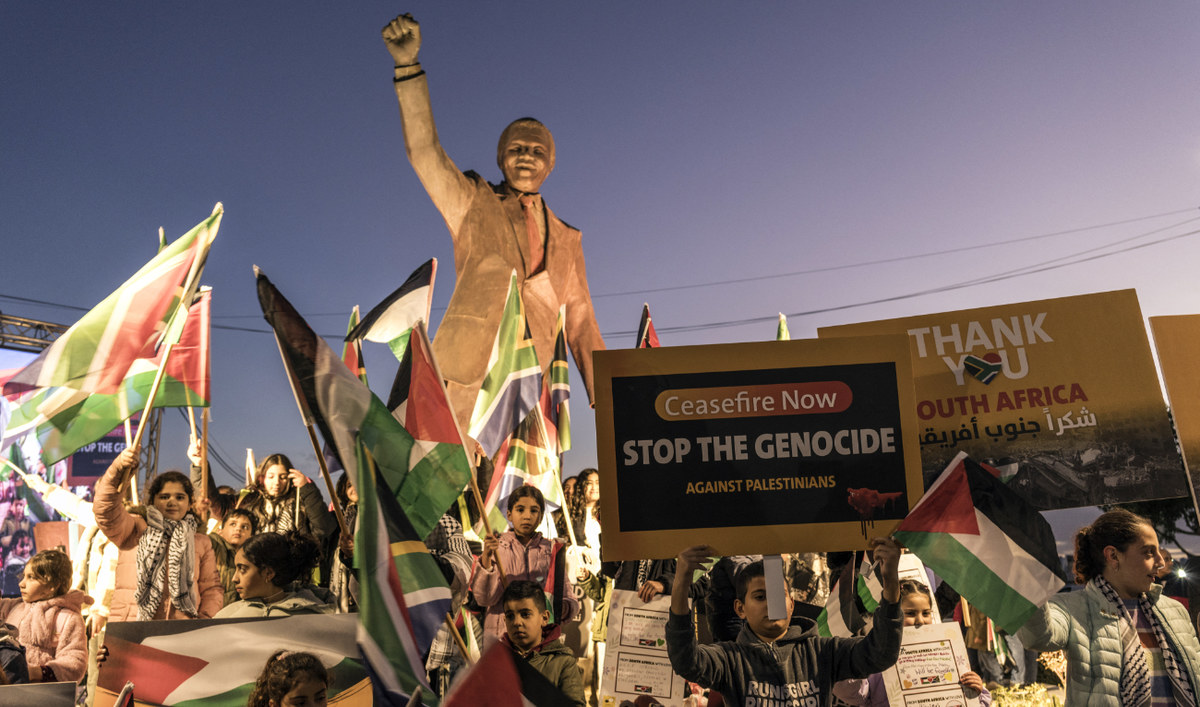
People raise flags and placards as they gather around a statue of late South African president Nelson Mandela to celebrate a landmark genocide case filed by South Africa against Israel at the International Court of Justice, in the occupied West Bank city of Ramallah on January 10, 2024.
South Africa’s ruling African National Congress has long compared Israel’s policies in Gaza and the West Bank to its own history under the apartheid regime of white minority rule, which until 1994 forced Blacks to live in specially designated “homelands.”
“Today we join the world in expressing horror at the war crimes being committed in Palestine through the targeting of civilians, civilian infrastructure, UN premises and other vulnerable targets,” Naledi Pandor, South Africa’s minister of international relations and cooperation, said in a statement on Nov. 7.
“These actions remind us of our experiences as Black South Africans living under apartheid. This is one of the key reasons South Africans, like people in cities all over the world, have taken to the streets to express their anger and concern at what is taking place in Gaza and the West Bank.”
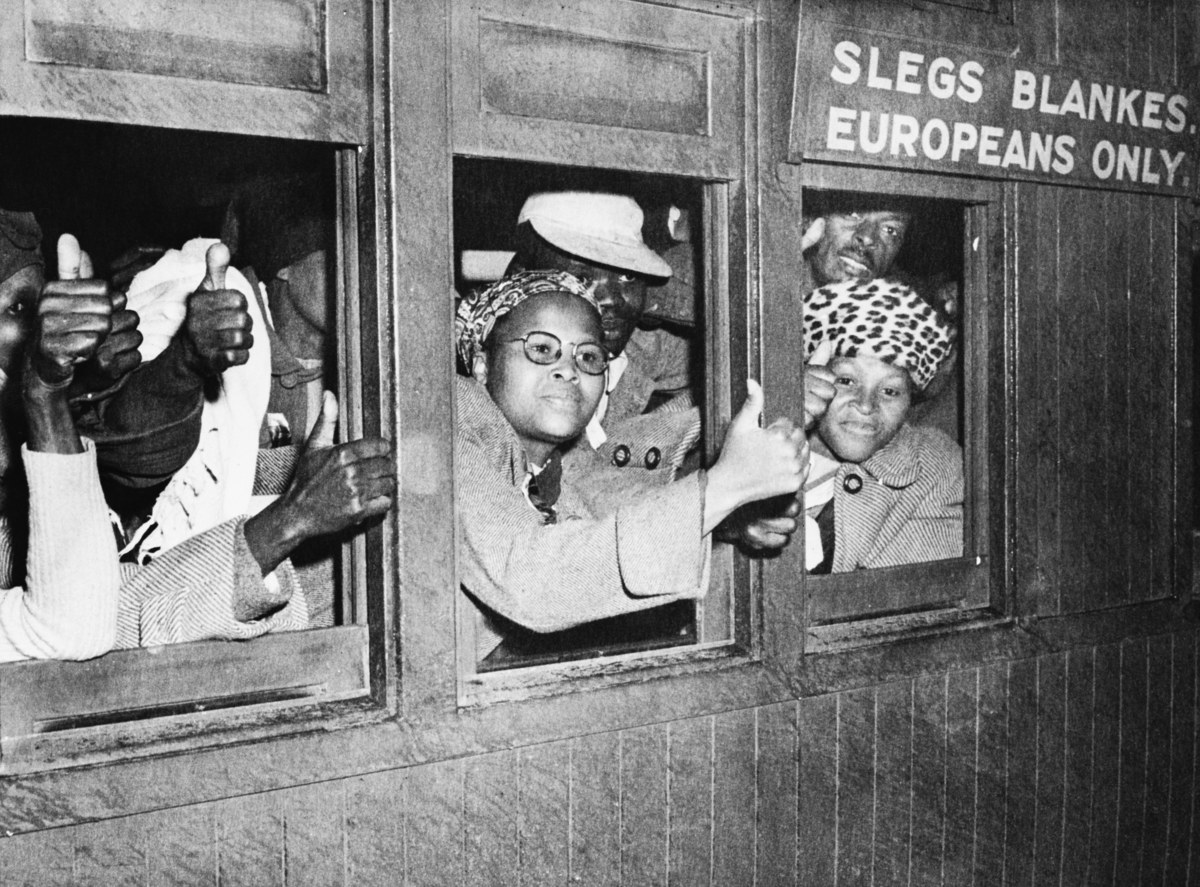
South Africa’s ruling African National Congress has long compared Israel’s policies in Gaza and the West Bank to its own history under the apartheid regime of white minority rule. (AFP)
Israel launched its military campaign in response to the Oct. 7 Hamas attack on southern Israel, which saw Palestinian militants kill some 1,200 people, mostly civilians, and take 240 hostage, including many non-Israeli foreign nationals.
Since then, the Israel Defense Forces have waged a ferocious air and ground campaign against Hamas, which has controlled the Gaza Strip since 2007, killing more than 25,000 Palestinans, according to the Hamas-run health ministry.
Since the war began, symbols of solidarity have sprung up across South Africa. Street artists have painted murals of the Palestinian flag, billboards have been erected accusing Israel of genocide, and stickers featuring slogans like “Genocide IsREAL” and “#FreeGaza” have been distributed.
“As a South African, one knows oppression, resistance and apartheid,” Leila Samira Khan, a South African lawyer and activist, told Arab News.
“Palestine is intertwined with South Africa’s fight for freedom. I was born in the Netherlands to South African parents in the ’70s and was named after Leila Khaled,” she said, referring to the famed Palestinian activist.
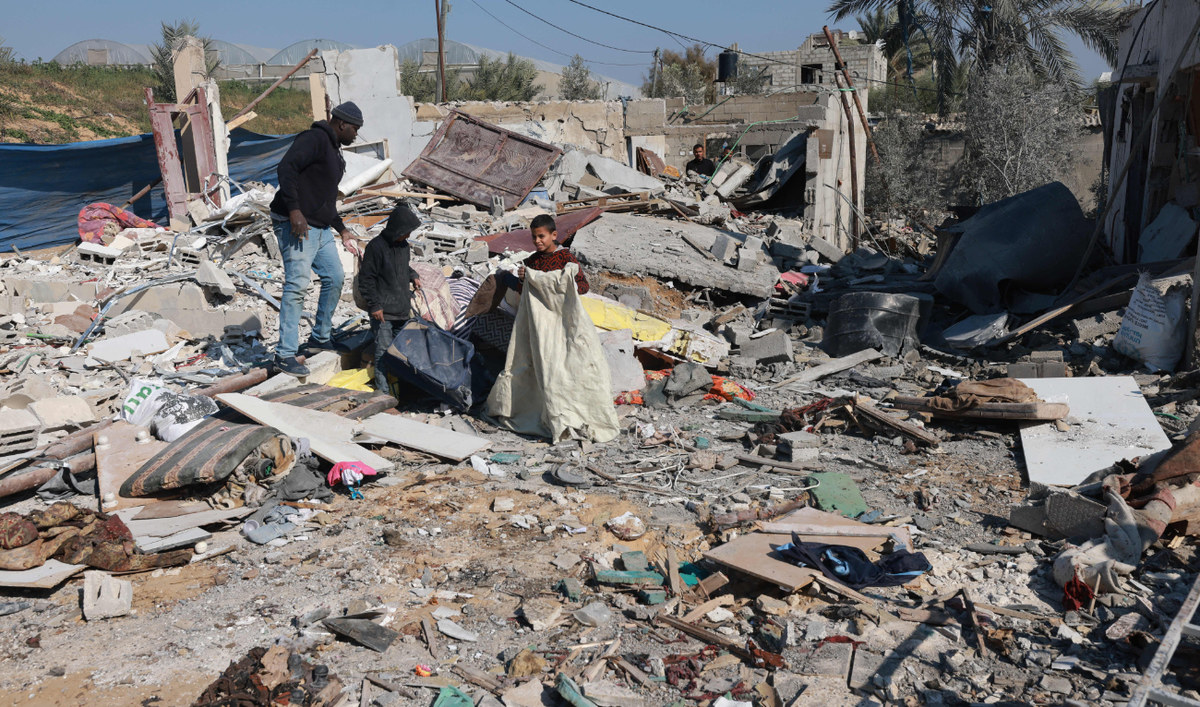
Palestinian children look for salvageable items amid the destruction on the southern outskirts of Khan Yunis in the war-battered Gaza Strip on January 16, 2024. (AFP)
South Africa recalled its diplomats from Tel Aviv in early November. Later that month, its parliament voted to suspend all diplomatic ties with Israel and to close the Israeli Embassy in Pretoria. Israel has since recalled its ambassador.
Then, in December, in a move which thrust South Africa into the international spotlight, it filed its suit against Israel at the ICJ, accusing it of breaching the Genocide Convention.
“The scale of destruction in Gaza, the targeting of family homes and civilians, the war being a war on children, all make clear that genocidal intent is both understood and has been put into practice,” Tembeka Ngcukaitobi, a member of the South African legal team, said in the ICJ.
“The articulated intent is the destruction of Palestinian life in all its manifestations.”
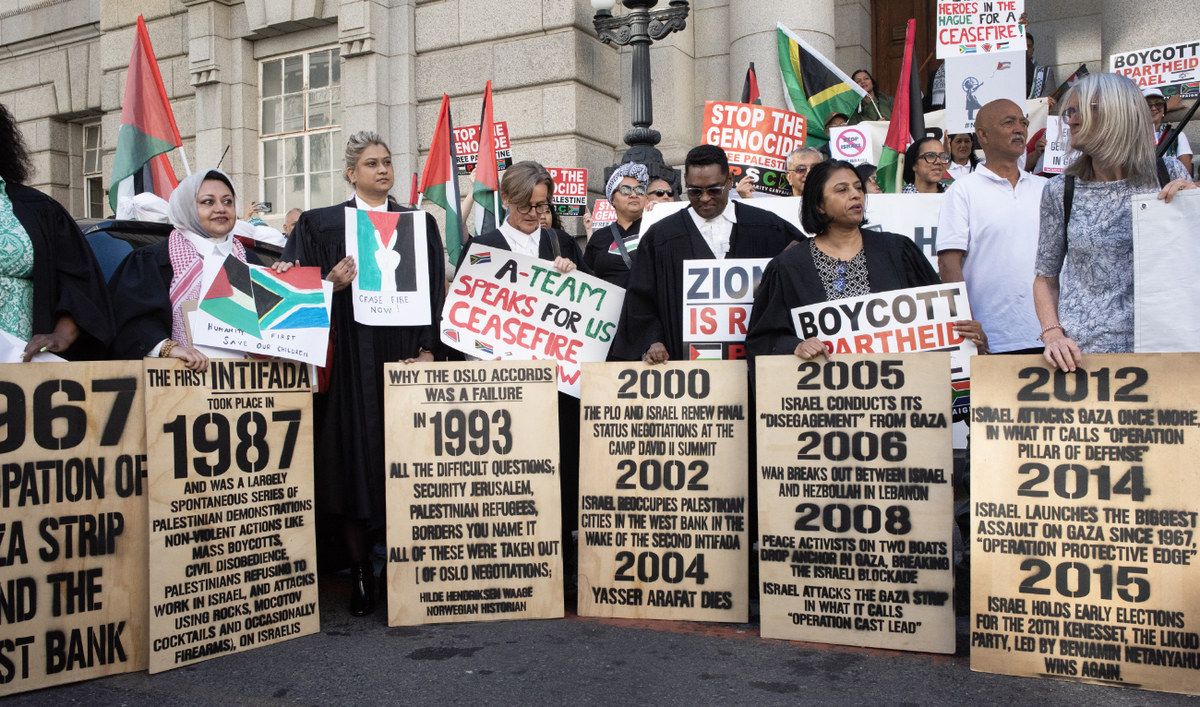
A group of lawyers and advocates hold placards as they take part in an interfaith protest in solidarity with Palestinian people outside the High Court in Cape Town on January 11, 2024. (AFP)
While the case has irked many Western governments, it has won South Africa praise from nations like Turkiye and Malaysia and groupings like the Organization of Islamic Cooperation, which have joined the case.
This championing of the Palestinian cause in South Africa has deep roots that date back to the days when the ANC was waging its own decades-long campaign against apartheid, a system that prevailed from 1948 until the early 1990s.
Under apartheid, the white minority dominated politics, business, land ownership, and all facets of civic life, while enforcing a system of harsh racial segregation and discrimination that deemed the races “separate but equal.”
In reality, Black South Africans who lived through that period recall feeling marginalized and like second-class citizens in their own land — feelings not dissimilar to those felt by the Palestinians in the occupied territories.
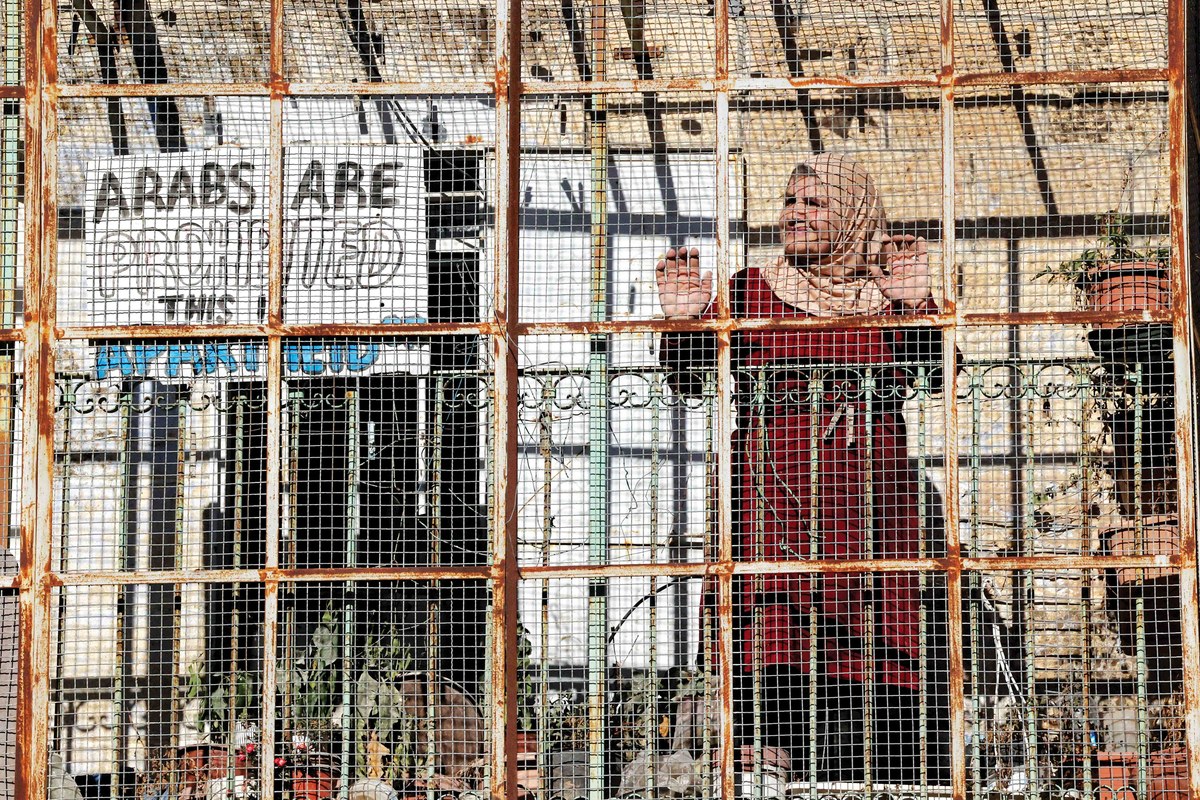
Black South Africans who lived through apartheid recall feeling marginalized and like second-class citizens in their own land — feelings not dissimilar to those felt by the Palestinians in the occupied territories. (AFP)
“As South Africans we feel deeply connected to the Palestinian struggle,” Thania Petersen, a South African artist based in Cape Town, told Arab News.
“We understand and recognize apartheid as well as the devastation which comes with dealing and living in a post-apartheid society.”
Meanwhile, even as much of the international community introduced sanctions against apartheid South Africa for its increasingly unpopular policies, Israel continued to supply the white-minority government with weapons and technology.
The ANC’s solidarity with Palestine dates back to the 1950s and ’60s when several African nations were gaining independence after centuries under European colonial rule.
During its struggle against apartheid, and later once in power, the ANC fostered close ties with the Palestine Liberation Organization.
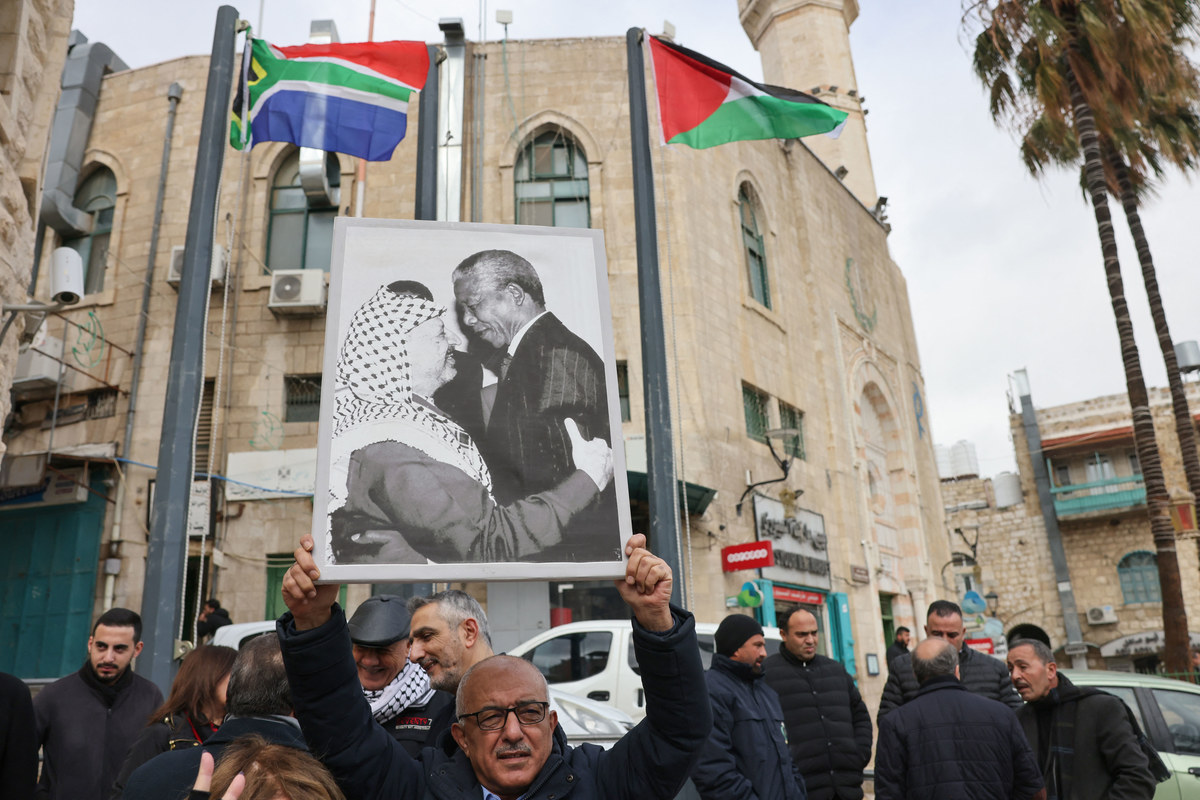
A Palestinian man holds a portrait of late Palestine Liberation Organisation (PLO) leader Yasser Arafat and South Africa’s anti-apartheid icon Nelson Mandela as the national flags of both nations flutter outside the municipality building in Bethlehem in the occupied West Bank on January 12, 2024. (AFP)
Nelson Mandela, South Africa’s first post-apartheid president, who spent 27 years in jail for his fight against white minority rule, was even on friendly terms with PLO Chairman Yasser Arafat.
On Feb. 15, 1995, a year after South Africa’s first non-racial elections, which propelled Mandela to power, the newly-minted “rainbow nation” established formal diplomatic ties with the State of Palestine.
For years, the ANC and the PLO supported each other’s anti-colonial campaigns, trading weapons and consulting on strategies to do away with colonization.
A significant moment that solidified South Africa’s ties and commitment to Palestine was when Arafat met Mandela in Zambia in 1990, barely two weeks after the latter had been released from prison.
Mandela subsequently visited both Israel and Palestine and called for peace between both nations.

Yasser Arafat, right, greeted Nelson Mandela when the latter arrived at Gaza airport in 1999 for an official visit to Palestine. (AFP/File)
“We know too well that our freedom is incomplete without the freedom of the Palestinians,” Mandela said in 1997 during a speech marking International Day of Solidarity with the Palestinian People in South Africa’s capital, Pretoria.
“The temptation in our situation is to speak in muffled tones about an issue such as the right of the people of Palestine to a state of their own. We can easily be enticed to read reconciliation and fairness as meaning parity between justice and injustice.
“Having achieved our own freedom, we can fall into the trap of washing our hands of difficulties that others face. Yet we would be less than human if we did so.”
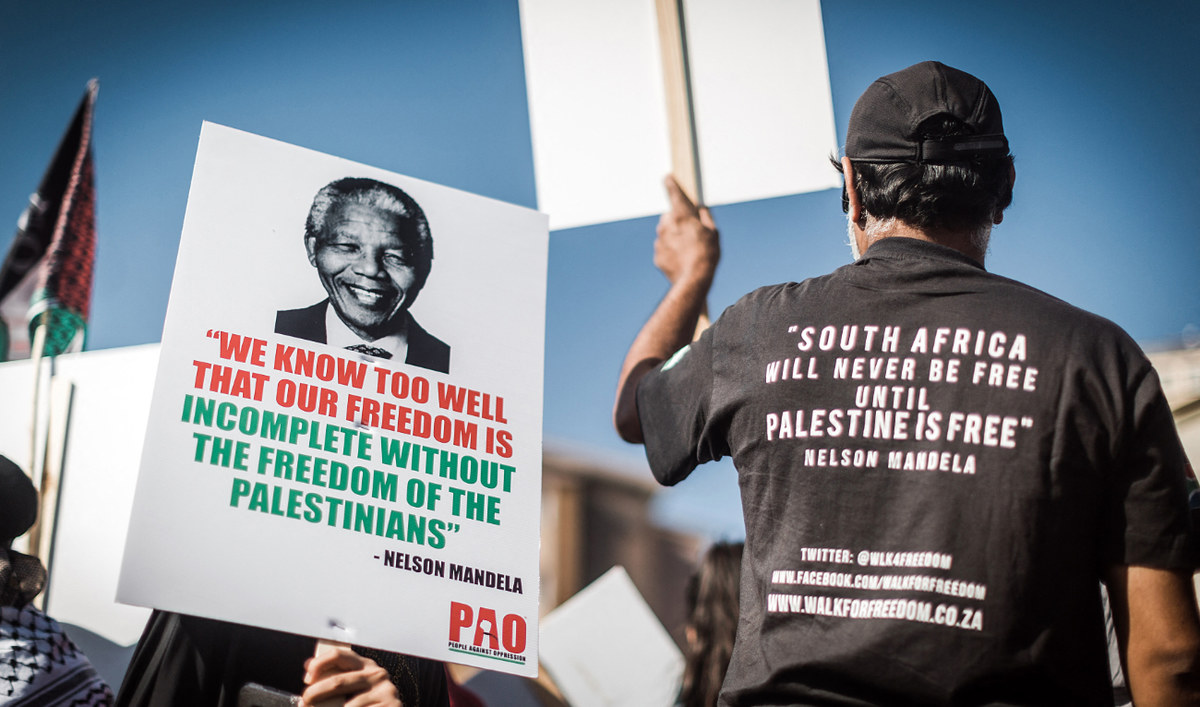
Pro-Palestinian groups and other civil society organizations demonstrate, in Durban on June 2, 2018 to protest against the killing of Palestinians by Israeli forces in Gaza. (AFP/File)
South Africa’s support for the Palestinian cause continues fervently to this day. In the ANC’s latest policy document, published in late 2022, the ruling party emphasized South Africa’s historical ties to Palestine.
“South Africa and Palestine share a common history of struggle,” the document said, describing Israel as an “apartheid state” and declaring its intention to loosen South Africa’s diplomatic ties with Israel.
“As individuals we feel deeply for Palestinians because we know apartheid, we know what it looks like and we live with the ongoing violence of its legacy,” Petersen told Arab News.
“We have an obligation to humanity to fight what we know is wrong. As South Africans we will always fight against apartheid and colonialism. Our leaders have always uttered the words that our freedom is incomplete without the freedom of Palestine.”
In a recent piece for The Economist, Suraya Dadoo, a South African writer and activist, said: “South Africa’s voice has been the loudest, mainly due to the fact that our liberation history and struggle is most recent, and that the system of apartheid that Israel practices against the Palestinians is eerily similar.
“Settler colonial societies can only exist with the absolute annihilation of the indigenous people or by the complete subjugation of the people and their land. There is no other way they can sustain their existence but through violence.”
While South Africa’s championing of the Palestinian cause is understandable given its own struggle against apartheid, it has been harder to reconcile its support for Hamas.
After the Oct. 7 attacks, many Arab countries that were sympathetic to the Palestinian cause sought to distance themselves from the militant group. Although it condemned the atrocities, South Africa was slower to do so than other nations.
By contrast, it rushed to condemn the mounting Palestinian death toll in Gaza after Israel launched its retaliatory campaign.
South Africa is one of just a handful of countries that has formal diplomatic relations with Hamas — a group that many nations consider a terrorist organization.
Its openness to relations with Hamas is partly informed by its own history. Indeed, the ANC was itself often considered a terrorist organization before the country made its largely peaceful transition to multi-racial democracy.
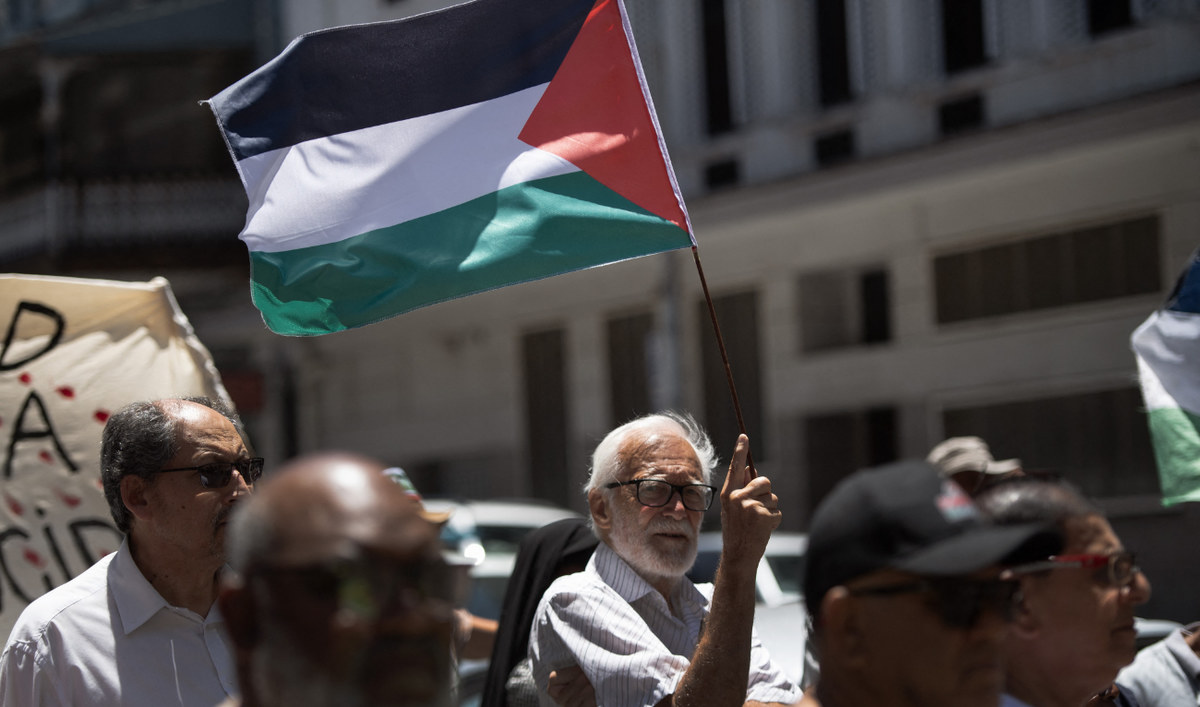
A man holds a Palestinian flag as they take part in a pro-Palestinian demonstration outside the High Court in Cape Town on January 11, 2024. (AFP)
South Africa’s claim that Israel is committing acts of genocide against the Palestinians has also exposed it to accusations of double standards, particularly as its government appears to take a softer stance on the misdeeds of other armed actors.
Just a week before making its case at The Hague, South Africa’s President Cyril Ramaphosa hosted Mohammed Hamdan Dagalo, a Sudanese warlord known as Hemedti, whose Janjaweed militia and its successor, the Rapid Support Forces, is accused of committing acts of genocide in Darfur.
The RSF paramilitary group has been locked in battle with the Sudanese Armed Forces since April last year, sparking one of the world’s worst humanitarian disasters, which many fear could destabilize the wider region.
However, Petersen says public opposition to Israel in particular runs far deeper for South Africans, mindful of its past support for apartheid.
“Palestinians and South Africans are fighting the same fight,” she said. “It is not (a) separate (issue that) Israel was involved with the apartheid government in South Africa and it is not surprising that the Zionist lobby in South Africa benefited from apartheid.”



































